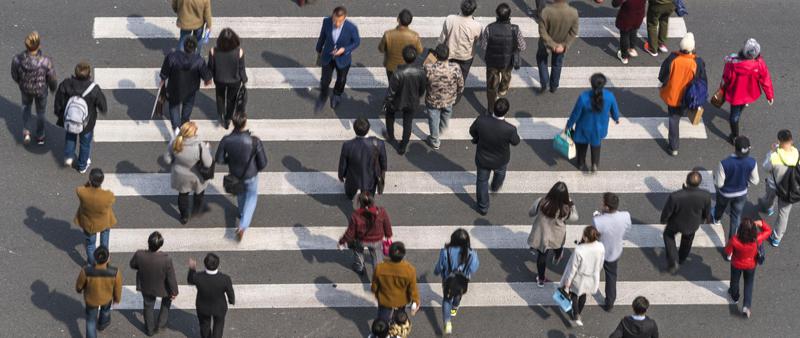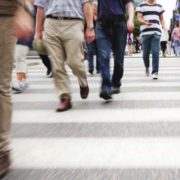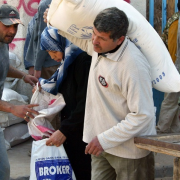Between 541 and 542 a great plague devastated both the Byzantine and Sassanid empires, heirs of the Roman and Persian traditions. The two mighty and ancient states were devastated by the death toll and the impact on their collective social psychology.
In those years, the new messianic Muslim faith swelled at their periphery, and pushed back the Byzantine ambitions to reconquer Europe from Constantinople and reestablish the real Roman empire. It also put an end to both the Sassanid Empire and its Zoroastrian religion, which dominated the ancient world for over a thousand years.
Between 1347 and 1351 the infamous Black Death swept through Europe, decimating its population. At its end, a period of cultural Renaissance exploded, canceling the remains of feudal society and helping bring Europe to modernity.
Large plagues have been harbingers of great changes: the birth of the Islamic world or of the Renaissance, and the death of old institutions, like the old Roman and Persian empires and feudal culture. China missed its wake-up call in 2003, underestimating the symbolic and material significance of SARS. What will it do after facing the much larger and more dangerous coronavirus now?
Sick of the disease
Information on the new coronavirus flu apparently is still very sketchy and incomplete. It seems that the virus is not easy to detect. It has a long incubation period, up to 14 days, during which there can be no symptoms, and yet the carrier may be contagious. There have been cases when infected people were missed for days, because they had no fever or the test-kits tested negative. Since early February, scans and better criteria have been introduced, but still there are no guarantees that all infections are or will be soon under control.
In fact, by official admission, some 5 million people left Wuhan before the city was officially put on “lockdown” on January 23, two days before China’s most sacred holiday, the Spring Festival, when everybody goes back home. By then, how prevalent was the flu in the city?
Official accounts say that on January 1 three doctors were reprimanded by the police for spreading “fake news” on a new disease. The Chinese police are very cautious, and don’t rush to action, especially with brand new incidents. They need to have meetings and lengthy deliberations. Then the police should have known about this news for at least a week, maybe two before the reprimand. This pushes our timeframe back to around December 20.
Chinese doctors are also cautious, especially in their environment, and they must have noticed human-to-human transmission for a week or two before spreading news of the disease. Plus, there is the incubation period of about 14 days. This pushes us to the beginning of December or even late November. Early animal-to-human transmission could have happened in mid-November.
That is, the disease could have started and developed for two months before the situation began to get under official attention. All of this took place in a densely populated area with an extremely mobile population. The majority of those 5 million who left Wuhan went to surrounding Hubei province, but many traveled all over the country. In fact, less than a month after the Wuhan lockdown, all of China is infected and another even larger city, Hangzhou, has also been put on lockdown.
But how many people are really infected? Many things are unclear about the disease. We do not know if there are healthy carriers (common with all plagues); we do not know if people dismissed from hospitals are still infectious. Of the millions who went to the countryside and have not yet come back to the cities, how many are sick or infected? How many died without reporting their diseases? China’s rural areas are usually a black hole.
One Italian evacuated from Wuhan and with no sign of infection, turned up positive to the tests after five days in Italy. One of the nine Belgians evacuated turned out to be positive. These are foreigners, sheltered people, often leading better lives than some Chinese. Then an infection rate of 2–3% of the population of Wuhan could be possible?
In this situation the number of confirmed cases is what it is – confirmed cases. But many people may be outside the confirmed cases. Are dead people checked for their causes of death? That is, the present death rate for the coronavirus refers to confirmed cases of people who died. But if one was not a confirmed case and died at home, is someone checking why he died? He might have had coronavirus and infected dozens but refused to go to the hospital.
The situation is very confusing. Or at least, I’m very confused.
The economy
Yet the confusion is confirmed by the fact that responsibly now, the government doesn’t have any clear indication about when life could go back to normal and the infection could get under control. Here a horrible vice for the Chinese government. If Beijing rushes people back to work without being sure that the infection has been cured, the flu could re-explode with vengeance – then China and the world are back to square one, or worse. If Beijing doesn’t restart its economy, now accounting for 16% of the global GDP, what will happen to China’s wellbeing? What will happen to the urban food supply if production doesn’t pick up?
Less than a month after Wuhan’s lockdown and with no end of the disease in sight, it is difficult to gauge exactly what impact the coronavirus will have on the Chinese and the global economy. We know China is already preparing a massive stimulus package to help the economy rebound. But the size of the package will have to increase with the length of the outbreak because with time the damage to the economy will also increase, thus making the rebound more difficult and more costly practically every day.
Yet certainly there are a few elements that can already be factored in. China’s economy at the time of SARS in 2003 was smaller than Italy’s; now it is more than 4 times larger. To restart a bigger economy is more difficult and costly than to rekindle a smaller one, although there is much more money available. Moreover, the foreign environment around China was friendly, because for the US and the Western world the main enemy was Islamic terrorism. Now there is growing hostility toward China. Will the US and the Western world help China to get on its feet? And in return for what? What will China do if the West will help in return for some gain, like in 2003? Will it show gratitude and move in the direction the West would want?
Moreover, between the US and China, decoupling is already happening. This is partly because of the ongoing trade, technological, and strategic confrontation with the US, and partly also because it is difficult for a long-term investor to trust the basic health environment in China when two deadly diseases spread overnight just 17 years apart. Yes, in Africa and other underdeveloped countries there are chronic epidemics like ebola or malaria, but an investor factors them in if he is interested in those places, and this means extra costs. Should foreign investors also factor in the possibility of periodic massive outbreaks of infectious diseases? What discounts should China build in to restart global interest in investing and doing business with Beijing?
Moreover, allegedly sales in China’s real estate market fell by 90%, and car sales by 80%. Restaurants, hotels, bars, cinemas, and shops are empty. It is only a matter of time before the stock exchanges register the drop of sales in the Chinese market and react to it. Until a few days ago, people could think that the disease would soon be under control and the market would rebound. Now that the outbreak has gone on longer, and the rebound more difficult and costly, what will the market do? Demand for commodities are down, (oil, iron, copper et cetera) which is making countries like Argentina, already wounded by a serious economic crisis, jittery about the prospects of one of its main export market. Many countries are following developments with great tension.
Certainly, US President Donald Trump wouldn’t want to go into the election in November with the markets down, and certainly the Chinese don’t want a market crash. But can these forces prevent an objective market reaction?
Systemic traps but in control
We already wrote of the deep troubles and contradictions between cities and rural areas.[1] Yet there is another systemic problem: officials in charge were slow and unresponsive. This is true for all bureaucracies, which face issues at their own pace and without a sense of urgency. But here there are specific Chinese characteristics.
Perhaps it is not just that the provincial officials were bad and unresponsive. They might have been unwilling to be proactive because the whole system of power that consolidated since the 1980s with Deng Xiaoping fell apart, and a new one is in place. In the past 60 years, there was Mao Zedong, Deng, and now there is Xi Jinping. Many officials wonder how long Xi’s system will work. As Mao’s and Deng’s systems tumbled, there will be a reckoning against Xi, too. Will it be in 30 years or three? No one knows. Many think, if we are too eager, we’ll fall with him when he falls. Moreover, who knows what Xi really wants? If we are too proactive and Xi disagrees with us, then we are in trouble. If we act just by the book, nobody can blame us.
Yet, these are broad issues. In the short term, the situation is under control. There is no chaos, no panic in the Chinese cities.[2]
Some complain, but they stay at home and do not attack shops or start demonstrations. With more people infected and dead this might change… Or not because presently the general consensus is that the central government was wrong footed at first but now it has mobilized resources like no other government in the world. There is lots of fear, but also, at the moment, there is confidence the government is doing the best it can. But the initial idea was that like with SARS in 2003, things would get back to normal in about a month. Yet now some three weeks into the crisis there is no idea about when things will get better. Will gloom sink in?
In any case, there could be a lot of soul searching at the end of this, and the economic impact could be hard. This was not a totally unpredictable event, a black swan, it was more like a “grey rhino”, as also Xi warned months ago, a predictable event that was largely overlooked. The swine fever has been ravaging China for about a year, it is not clear what happened with the meat of the culled pigs. Where they all clearly incinerated? Or some of them found a way up in the food chain of cheap restaurants or as animal feed? The environment anyway was not healthy and something would have happened. But simply the system didn’t see it coming.
Changes are coming
The systemic problems all point out that Xi needs to change the system of power. Can he change (if he is willing to)? And what direction will changes take, forward or backwards? Many officials hope for some kind of restoration, but they don’t want some form of democratization because it would further undercut their power. Some 16 years ago reformer General Liu Yazhou[3] argued for the necessity of transforming the country into a democracy and following the United States. The US was China’s icebreaker. Without following America, Liu argued, China would have a harder time finding its way.
This is also partly the problem now. Looking at things from Beijing, there is no clear answer to that issue now. The Chinese system doesn’t work, but do other people’s systems work? Many Chinese wonder about this, looking at the huge controversies about Trump’s America and the surge of xenophobic populism in Europe.
«The past few years – indeed, the events of the past week, including the amateurishness of the Democratic caucus in Iowa, the grotesque circus of the State of Union, and the acquittal of President Donald Trump by the Senate of crimes that he has plainly committed – have shaken my belief in America». [4]
This vision, right or wrong, is shared by many in China.
Then what will the lesson be at the end of the crisis? Will China go forward or backward? Backward will be easier in the short term, but harder in the long term. The Chinese leaders know how to close down their country and run it with a more Maoist fist. Yet long term, the price would be huge – a return to poverty, isolation. Hardship was ok in 1949, because after a century of wars and destitution Mao brought back peace, and people were happy to live at least with only destitution. Now most Chinese have a middle-class life, for the first time in their whole millennial history. They have a car, millions go abroad, reasonably fancy themselves or their children to become rich. If China went back to iron-fist rule, all this would more or less gradually would disappear. It’s easy to become rich, it’s much more difficult to go back to poverty, especially after having tasted wealth.
Forward could be the opposite. In the long-term China could reasonably hope to fare well in a future liberalized free open market. Yet short term there would be immense problems with managing the systemic and massive transition. Many things could go wrong and this could compromise the eventual outcome. Moreover, Chinese economic reforms were shepherded by the World Bank which had a huge positive influence in assisting China in its choices. China then trusted, and rightly so the World Bank. But now it would be time for massive political and systemic reforms and there is no institution to help this transition which is both internal and international. Could the Holy See be of political help here?
Yet before getting to that, we shall first see how long the crisis lasts and assess the real damage at the end of it.
[1] http://www.settimananews.it/informazione-internazionale/the-coronavirus-and-tale-of-two-milks/
[2] See https://www.straitstimes.com/asia/east-asia/mood-in-china-is-not-all-doom-and-gloom
[3] 空军刘亚洲中将谈伊拉克战争分析我军发展方向2004年05月31日12:56东方网
[4] See https://www.theatlantic.com/ideas/archive/2020/02/how-americanophile-lost-his-faith-us/606388/






